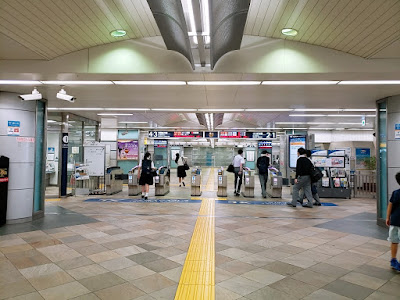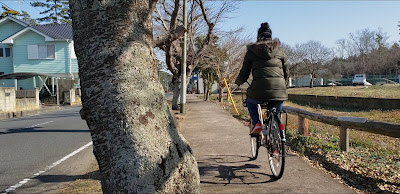Things to Know Before Going to Japan as a Language Student
Living in Japan, even as an exchange student or as a language student means that you have to know how to conduct yourself in society. Manners are required anywhere in the world and the same is true in Japan. You've probably heard the saying "when in Rome, do as the Romans do", well, "when in Japan, do as the Japanese do."
The concept of "Omoiyari"
If you go to Google Translate and type this in, you'll get "consideration" as its translation. But the Japanese concept of "omoiyari" is more than just that. The full definition of "omoiyari" is the consideration towards others by imagining oneself in another person's position and act accordingly with their point of view. This is the actual reason why the Japanese people exude an aura of politeness. People will go out of their way to avoid causing inconvenience or discomfort.
Building on the concept of "Omoiyari", let's go through a few things to keep in mind when you come to Japan as a language student.
1. Be aware of the people around you
One thing I noticed in Japan is how people will try and avoid bumping into you as much as possible. People try their best not to be an inconvenience to anyone so they try not to bump into you unless there is nowhere else to go (ie a crowded train). This also applies to other forms of inconveniences such as noise and littering.
Backpacks
People try to avoid bumping into you and you should try to do the same. You should wear your backpack in front if you are standing inside the train so that you don't bump other people accidentally. You never know who you're bumping into like old people, children, pregnant women to name a few. You can even see reminders of this in trains sometimes.
Talking on the phone in enclosed places
Talking on the phone may seem like a mundane thing to worry about but people in Japan tend to mind if you talk to someone on the phone in enclosed spaces. You will notice that they go outside to make their call, or in trains, they wait till they get off.
This also applies to other forms of noise like watching a video or listening to music without earphones, blowing your nose, even typing on a laptop with a noisy keyboard. Generally, a good rule of thumb is to just be as quiet as you can. You can have a hushed conversation with a friend, just keep in mind that there are people around you.
Eating and drinking while walking
It's considered rude to eat or drink while walking in Japan. It's perfectly okay to eat standing up but not while walking. If you eat and walk, you might drop your food, and people who step on it will be inconvenienced with it. You are giving other people who might be in a hurry consideration by not getting their shoes or clothes dirty.
Take your trash with you
You will notice that Japan is very clean, but there are hardly any public trash cans available. This is because people take their trash home. They don't just leave it somewhere for someone to clean it for them.
Smoking
Smoking is very common in Japan. But there are rules to follow when it comes to smoking. You cannot just smoke anywhere. There are designated places, even in open areas, where you can smoke. This is out of consideration for people who don't smoke. In the past, restaurants offer smoking seats but in recent years, these restaurants are growing less in number. Also, if you do smoke, it's best if you have a pocket ashtray with you so that you don't dirty up the place.
Vaping is considered similar to smoking and people tend to be uncomfortable with the "smoke" (I know it's not smoke, don't argue with me on this) this produces. You will only be able to vape in smoking areas.
2. Follow the signs
Pay attention to signs
There is a multitude of signage all over Japan and you would do well to follow them. Some signs tell you what to do, where to go, what not to do, etc. Don't worry, most of the time, these signs are illustrated, and recently, (initially as preparation for the 2020 Olympics) signages have English translations.
Follow the traffic lights, cross at the crosswalks
You will notice how people follow the lights even when the streets are empty. It would do you good to do the same. You never know when a traffic light is equipped with a camera that can capture your face. This applies whether you are a pedestrian or riding your bike.
As a pedestrian, on the occasion where there are no traffic lights, try and see if there are crosswalks (zebra stripes), and cross there. If there are none, try to cross at corners or intersections. Try to walk on the left side of the sidewalk as most people tend to keep left, especially in crowded streets.
As for bikes, signs show whether you can park your bike. There are bike parking spaces almost anywhere you go, so make sure that you're leaving your bike where it's supposed to be placed.
Speaking of bikes...
3. Bicycle Rules
Yes, there is a whole, dedicated section for bike rules.
Riding on sidewalks and keeping to the left
Japan drives on the left side of the road. So when you ride your bike, it would be best to keep it to the left. Technically, unless there is a sign on the sidewalk itself, you are not supposed to ride your bike on sidewalks. Well, the rule goes: Children 12 years old and below are allowed to ride on the sidewalk, in a situation where it "seems" dangerous, then you can ride on the sidewalk as well. This is one of the "gray area" kind of rules in Japan. My advice, use your better judgment.
If you do ride on the sidewalk, always remember that you should always yield to pedestrians. Hitting a pedestrian with your bike will cause you a lot of headaches the moment that pedestrian decides to press charges. Worst case? You end up in jail.
Get off your bike
In situations where you are entering a people-dense area, it is best practice to get off your bike. When you cross the street at crosswalks it is best to get off your bike, unless you're the only one crossing or all of you are on bikes. There are also places where you will be asked to get off your bike (in signs) like in underpasses. If you think that maneuvering your bike is risky, just get off the bike.
Make sure you have bike lights
In Japan, it is required by law that you have a front light on your bike that is fully functioning. In addition to this, you are also required to have a rear reflector and a bell. Biking at night with no lights can get you stopped by police and you might be asked to pay a maximum fine of 50,000 yen. There are rumors that say the police don't really enforce this, but it's better to be on the right side of the law.
Don't ride double, don't ride drunk
Riding double, or 2 people riding one bike is prohibited in Japan. If and when you get stopped by police for doing this you might get slapped with a 20,000 yen fine.
Riding drunk on the other hand will land you in jail for up to 5 years. Plus a one million yen fine. You might notice, or read somewhere, that police don't really enforce this, but are you really willing to risk it? You can always leave your bike and get it in the morning, or simply push it home.
Hands on the handlebars at all times
When riding your bike, make sure you have both hands on the handlebars. You should never hold an umbrella with one hand. On the same note, you shouldn't hold your smartphone while biking. Any of these violations can cost you up to 50,000 yen in fines.
A similar violation is using earphones, earbuds, or headphones while you ride. The rationale behind this is, despite having your hands on your bike, you might not be able to hear oncoming vehicles that would help you react accordingly. This is also fineable by up to 50,000 yen.
4. House Rules
We are all familiar with having to take off your shoes before entering someone's home in Japan, but what other house rules should you be familiar with?
Shoes and slippers
Japan is famously known for the fact that you will have to remove your shoes when you enter someone's home. Upon entering the front door, you will enter the genkan part of the house. This is the part where everybody takes their shoes off to change to their indoor slippers. Most of the time they will offer slippers for you to use whilst at their home. This is also true for some offices (like at the dentist's and some clinics) and some public spaces. Just make sure to look around for a place to put your shoes and when in doubt, always ask if you need to take your shoes off. (靴を脱ぐべきですか - kutsu o nugubeki desu ka?)
Important note: Make sure to take off your shoes on the lower part of the genkan and not in the elevated part. This defeats the purpose if you step with your shoes onto the elevated part. The purpose of the genkan is to separate the outside shoes from the inside shoes.
On the topic of slippers, toilet slippers are a separate pair of slippers you use only for the toilet. In the context of separating indoor and outdoor footwear, the toilet is considered dirty, thus a separate pair of slippers. Never forget to put your toilet slippers back and trudge around the house in toilet slippers.
Make your presence known
If you live with other people (roommates, dormmates, etc), always announce your arrival. If you live there, announce yourself by saying, ただいま (tadaima) or ただいまです(tadaima desu) meaning I'm home. People at home would greet you back with: おかえり(okaeri) or おかえりなさい(okaerinasai) roughly translating to "welcome home." In case you are entering someone's home, announce yourself by greeting your host and saying: おじゃまします(sorry for the intrusion).
Alternatively, when leaving your home, announce this to your housemates as well by saying いってきます(ittekimasu) meaning "I'm leaving for the day"/ "I'm off to ~" (lit. I'll be leaving and coming back), to which your housemates would respond: いってらっしゃい(itterasshai) meaning "Have a nice day"(lit. go and come back). If you're leaving someone's home to go home yourself, you can say そろそろ 失礼します(sorosoro shitsureishimasu) which means "I'll be leaving now" and thank them.
Wait to be asked to sit
Whenever you are entering someone's home, an office, or anywhere you have to wait, always wait to be asked to sit. Do not just directly sit wherever. It is good manners to wait for your host to ask you to be seated.
Always ask permission
It's good practice, even with very good friends, to ask permission before doing/touching anything in someone's home. Japan is a culture of respect and it only shows that you respect your host when you ask permission before doing anything like touching stuff and using the bathroom.
Ask to help out with cleaning
Even as a guest, you should still offer to help with the cleaning up. Most likely your host will politely decline, but it is polite to ask.
Coming to a foreign country can always be overwhelming but arming yourself with the most basic of expectations can help you avoid making the common mistakes most foreigners make. This also will prove to your school how serious you are with your studies when they see the effort you put in to really fit in. Don't worry though if you do make a few mistakes here and there, what's important is you learn from your mistakes.
These tips should help you ease into your daily life in Japan. If you enjoyed reading this, you might enjoy these articles as well:








Comments
Post a Comment